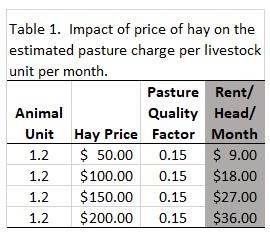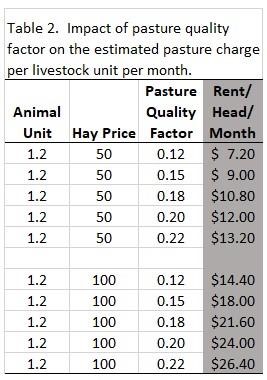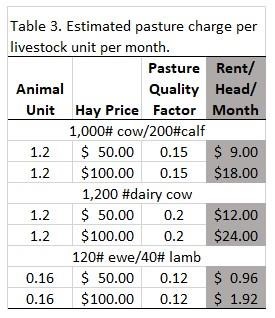By Clifton Martin
Rental rates and hay prices are two questions quickly asked with potential lengthy answers. Many factors will affect market prices both over time and regionally. This is a quick discussion to look at some ballpark ranges on how pasture rental rates can be determined.
Published in 1998, OSU Bulletin 872, Maximizing Fall and Winter Grazing of Beef Cows and Stocker Cattle, presents calculations using the rent per unit of livestock on a monthly basis using the formula animal weight per 1,000 lbs x hay price per ton x pasture quality factor.
Where Pasture Quality Factors are as follows:
0.12 = 0.12 unimproved condition
0.15 = 0.15 fair to good permanent pasture
0.18 = 0.18 very good permanent pasture
0.20 = excellent meadow (grass/legume)
0.22 = lush legume pasture
The example in Bulletin 872 uses a 1,000 lb cow with 200 lb calf (1.2 animal unit months), hay price of $40/T, and pasture quality of 0.15.
Example: 1.2 X $40 X 0.15 = $7.20 rent/head/month
This is a fairly standard calculation which attempts to adjust for forage quality and time on pasture but not the only method producers or landowners may need. It is also easy to adjust and customize based on individual conditions. More systems of calculating rental rates can be found in OSU Extension Fact Sheet FR-8, Establishing a Fair Pasture Rental Rate.
Calculating the price of hay can be moving target and it can be tough to provide a direct answer if asked. This is especially true when supply and quality appear to be low and markets are active. Rent conversations can go the same direction, but there are tools to help move everyone into the ballpark for effective conversations and help frame expectations. Ultimately, producers must know their own cost of production for profitably and landowners must know their own cost of ownership before the conversation starts.
For our purposes here, the ballpark boundaries are the above calculation and statistics from the USDA National Agricultural Statistics Service. Consider the following:
Pasture Rental rates per acre in the state of Ohio ranged from $12.50 to $66.50 across 34 reporting counties in the state of Ohio in 2019 (USDA NASS). For the sake of discussion, if we throw out the high and low, the range is then $12.50 to $56.50 (more than one county reports $12.50).
In a ten-year time span from 2008 to 2019, the average pasture rental rate per acre in the state of Ohio varied from $25-$47. (USDA NASS)
With an animal unit of 1.2 and fair pasture quality of 0.15, rent per head per month ranges from $7.20 (hay price $40/T) to $36.00 (hay price $200/T).
The annual average price of hay for the state of Ohio from 2008 to 2019 ranged from $112 to $193 (USDA NASS).
Table 1 Presents an adaptation of the rent/head/month calculation presented in Bulletin 872 to quickly demonstrate the impact of the price of hay. Table 2 presents price ranges based on changes in the quality of the pasture. Table 3 provides examples of calculations on cow/calf, dairy, and ewe/lamb livestock. Any claims of high pasture quality and high hay quality should have supporting records to support the claim.
Table 1.

Table 2.

Table 3.

As always, there are a whole host of reasons that some of these numbers may not make sense in every situation. I often get asked what the “going rate” is for both rent or hay, and the reality is the best I can do is drop a few numbers to show what some of the boundaries are to frame a discussion. The numbers presented here are part of one approach among many and should be evaluated against other methods and opportunities.
Source : osu.edu